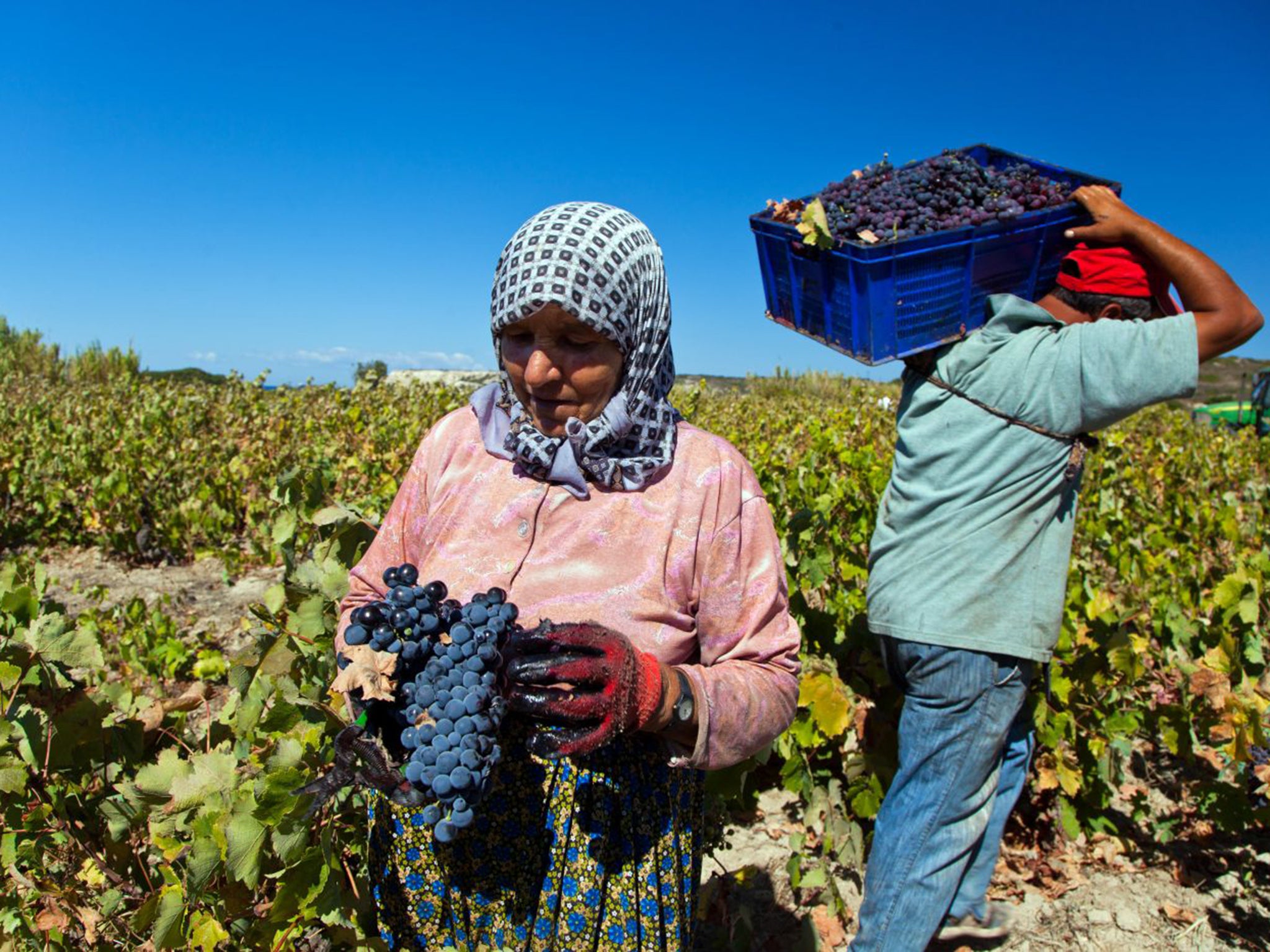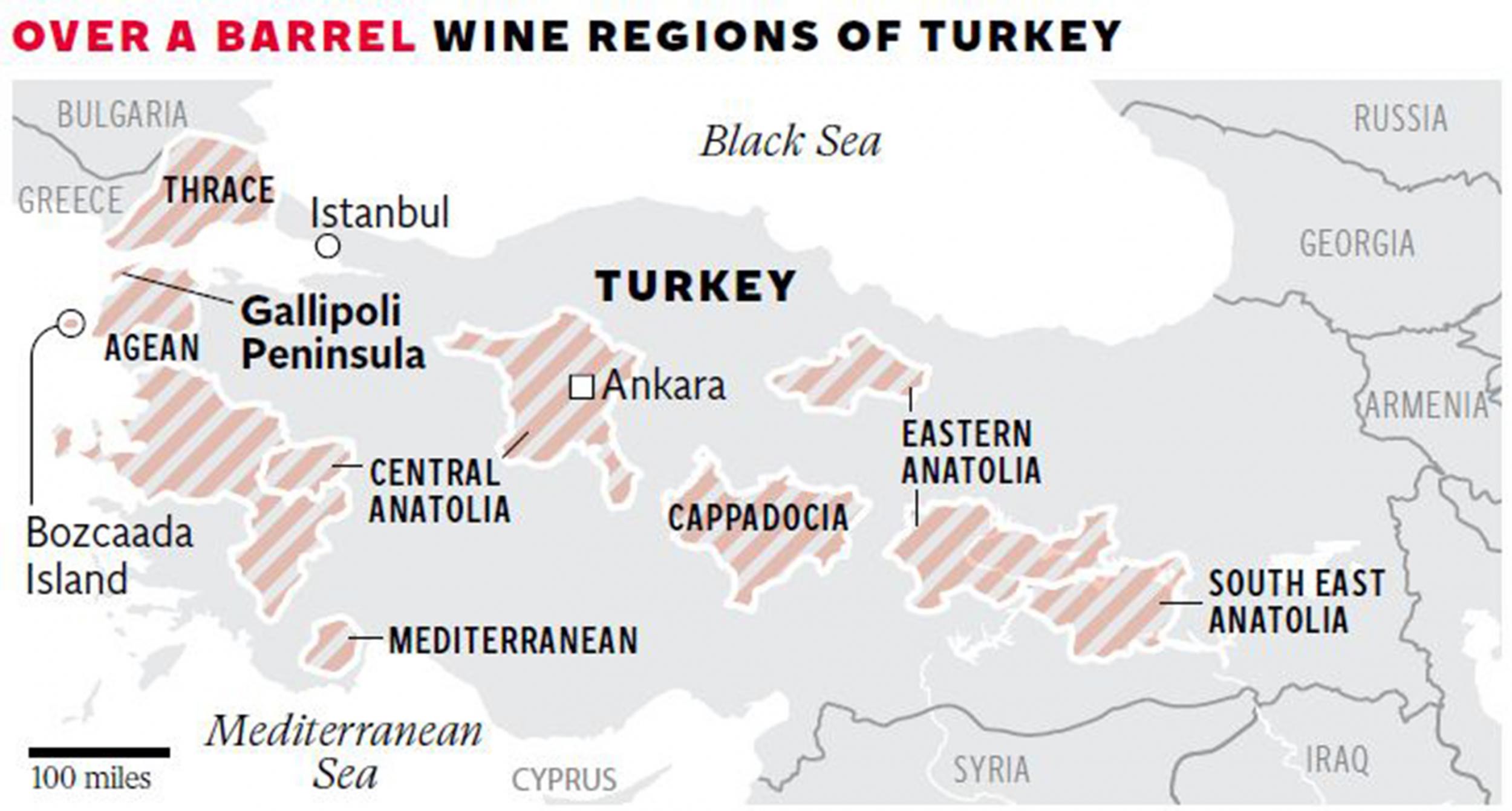Turkey wine-making tradition under threat from Islamic-rooted government's new alcohol laws
The ancient culture dates back to the time of Homer but today’s workers are suffering as rules introduced by conservative Muslim politicians mean the industry cannot advertise and produce is heavily taxed

Wine has been produced in Turkey for thousands of years – Pliny the Elder lauded the sweet spiced wine from Galatia in central Anatolia, while Homer’s Iliad features pramnios, which was produced on the Aegean coast.
The successors of the ancient winemakers, however, are having a difficult time. Two years ago, Turkey’s Islamic-rooted government imposed a raft of new alcohol laws, including strict rules on the promotion of drink. Newer producers hoping to ride a fresh wave of interest in Turkish wine have been particularly badly hit.
Selim Ellialti began investing in vineyards on the Gallipoli peninsula in 2003. The endeavour was a retirement project for the successful IT entrepreneur and lifelong wine-lover. His first vintages were released for sale under the label Suvla Wines in 2012. The following year, the new laws came in. “It was a big shock,” Mr Ellialti said. “We can’t offer tastings, promotions, information or website visuals and it is forbidden to advertise any kind of an event.
While Suvla Wines is “surviving”, he is saddened and frustrated that he cannot trumpet a series of successes at international competitions in order to reach new customers. “The only way to reach the customers is to be on the shelf of a store or the menu of a restaurant,” he said.
Yunus Mermerci, whose Kastro Tireli label got up-and-running in 2010, wasted huge amounts of work. “We had to close our website, change and add warning labels, bring down the sign boards we had recently made and put up in several places in Istanbul,” he said. “All publicity materials – business cards, company letter heads – had to be changed, so related materials were all unusable.”
“Being a young winery, we were particularly negatively affected, as we are not allowed to even talk about our wines to the consumer,” he added. “The older wineries, with more established brand names, were not impacted as much.”

Turkey, where the vast majority of citizens are Muslim, has long had a complex relationship with alcohol. About 85 per cent of Turks do not drink, though only about two-thirds believe it is morally wrong to consume it.
The current battle is one of a series of totems in a deeper political struggle about Turkey’s cultural values and outlook. When the Justice and Development Party (AKP) swept to power in 2002, it became the first party with a religious bent to take the helm in modern Turkey. Its leaders, who see themselves as pious Muslims, set about rebalancing what they saw as the long-standing social oppression of Turkey’s social conservatives by the secular elite that had dominated politics for 80 years.
The right to wear the headscarf, previously banned from public institutions, became one symbolic front. Another was alcohol, which had long been held up by those with a more secular, Western outlook as a sign of their enlightenment. In the words of the anthropologist Jenny White: “In Turkey, a sip of whisky, like a drop of blood, is a highly charged cultural marker of social class, lifestyle and political values.”
The AKP began by increasing taxes on alcohol. In 2013, still flush from his third election victory, the then Prime Minster Recep Tayyip Erdogan went further, with a highly-divisive new batch of laws. They included the new marketing restrictions, a ban on new bars opening near mosques, and the introduction of labels warning consumers that “alcohol is not your friend”.
Mr Erdogan, who last year assumed the post of President, said that the changes were to protect society from the ills of drink and to stop young people “wandering about in a state of inebriation”. Critics, such as Mr Mermerci, say that such statements obscured his true agenda. “These changes seem to be introduced to make life difficult for producers of wine and other alcoholic beverages,” he said.
Mr Ellialti blames the government’s attitude on what is he says is the “less educated background” of the majority in Turkey, claiming: “They do not have any international background or awareness of different lifestyles.” Supporters of the AKP would point to such language as evidence of the culturally superior attitudes of the old ruling class.
Bans on alcohol are not new to Turkey. For much of the Ottoman Empire there were tight restrictions, though there was the odd exception – the son of Suleiman the Magnificent was known as “Selim the Sot”.
Champions of Turkish wine warn that the current climate is damaging the industry and exacerbating cultural rifts. Mr Ellialti, of Suvla Wines, says the government is treating wine producers “like drug dealers or terrorists” and wishes it would display more tolerance towards their craft.
Mr Mermerci was more optimistic. “I am pretty sure the Anatolian wine will rebound with the efforts of the recently emerged, diligent boutique wineries, no matter what obstacles there may be.
“Wine has been produced for thousands of years in these lands,” he said, before adding a metaphor that would surely meet with Homer’s approval: “This has been a hiccup in the process.”
Join our commenting forum
Join thought-provoking conversations, follow other Independent readers and see their replies
Comments
Bookmark popover
Removed from bookmarks